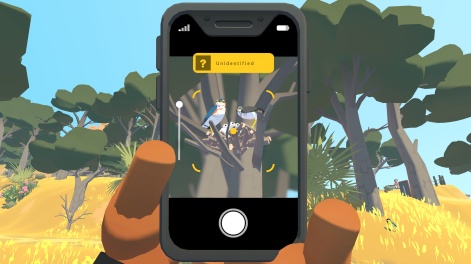Despite being celebrated as this year’s Mobile Legend at the 2022 Mobile Games Awards, Danny Gray, chief creative officer (CCO) at ustwo games, describes himself with remarkable modesty – “When I graduated, I was a two-or-three out of five in every aspect of game development, but not excellent at any singular thing”, which certainly contradicts the first class degree he left Leeds Metropolitan University with.
But it’s not Gray’s style to sit back and wait. Several months after graduating, Gray was informed of a dropout at Lionhead Studios’ QA work experience programme – which, at the time, had a six-month waiting list – and rushed himself to Guildford. He remained with Lionhead in QA and subsequently as a producer on Project Milo (also known as Milo & Kate), Microsoft’s bizarrely ambitious Kinect experience. But despite working between Lionhead, Kuju Studio, and Hello Games over the next few years, Gray never quite settled.
“I love games, triple-A and indie, but I was only working on… gamer’s games. The games industry is a super homogenous space, and I couldn’t help but think there has to be a different audience we can make games for. And it sounds stupid but I always felt I didn’t fit 100 per cent in those previous places.”
When I walked into this weird, clichéd Shoreditch design company, I was pretty sure that if we make a game in this environment, it has to come out differently.
Danny Gray
Gray saw a position at ustwo, before the games division was fully established and it was a project of the ustwo design agency. “I thought, ‘wow, these guys really know design’ – artistic, modern, mainstream graphic design. Bear in mind, this is 10 years ago: at the dawn of the App Store, before F2P and casual mobile has kicked off.
“When I walked into this weird, clichéd Shoreditch design company that genuinely seemed like it was modelled on Nathan Barley (a 2005 cult UK television programme that satirised media industries and early ‘00s hipster culture), I was pretty sure that if we make a game in this environment, it has to come out differently.”
Gray remarked on consternation from friends and colleagues – “’you’re leaving the studio making No Man’s Sky’ (although it didn’t have a name at the time) ‘to work on some crappy mobile games?’” – but out of the months of prototyping, ustwo games’ greatest hit, Monument Valley, was born.
“My theory about the environment turned out to be true. There was a real emphasis on user testing, and carrying the ethos that there was no wrong way to play the game – no difficult cap or expectation that the player had to be ‘good enough’, in the same way you approach an app or website.”
Head to chief
Gray has remained at ustwo since, although following the release of the studio’s VR experience, Land’s End, grander conversations about the structure of the games team followed. “We were pretty independent. There was no clear decision-making structure or proper job titles, per se, and you don’t want a company in that form.
“So, I moved into a head of studio position. Tellingly, I didn’t want CEO as I thought it sounded too business.”
Gray led ustwo through development of Apple Arcade titles Assemble with Care and Alba: A Wildlife Adventure – meeting his childhood goal of running a games studio by the age of 30. But, when former game director Lea Schönfelder left the company in 2020 and Gray took over director duties, he experienced an epiphany that might explain the passive tone he took to describing taking the head of studio position in the first place.
Tellingly, I didn’t want CEO as I thought it sounded too business.
Danny Gray
“I realised I had drifted too far from day-to-day development. But not only that, I knew there were drivers to running a company that I was never going to have: being as financially focused as I am creatively. Any good company needs that conflict, you get better results when those two factors are constantly debating and wrestling with each other. And it’s not efficient for one person to wear both hats. So, I had to choose.”
This choice was made all the easier with Gray’s existing relationship with current CEO María Sayans, who was serving as a non-exec board advisor at the time. “I had a great relationship with María, who really helped me figure out what I wanted to do most with my time. She’s great at representing both what I want and the commercial side and, frankly, without her, I wouldn’t have wanted to give up my position.
“I had a great time; running ustwo isn’t like running a company like Activision. But sometimes you get so focused on climbing the ladder, you think of progress as your target. But as you get older and analyse how you’re spending your time, you figure out what your priorities are.
“I basically demoted myself. But I didn’t care about not being the boss anymore; I just wanted to make great games, and this was the best way to do it.”
Monumental
In many respects, Monument Valley – a 90-minute, single-player experience with no leaderboards, IAA, retention mechanics, or franchised IP – is indicative of the studio’s separation from the wider mobile games industry. “We’re between worlds. I gave a whole spiel about never quite feeling like I fit in the industry, and as a company, we don’t 100 per cent fit in the mobile space.
“We don’t do user acquisition. We don’t do ads. We don’t do retention in the same way. We’re nowhere near as data driven as other companies are – that’s a purposeful decision about our culture. So, when we meet other people in the mobile industry and talk about the machinery that powers it, it still feels like we’re speaking two different languages. ustwo has its own strengths and weaknesses as a result.”
I want more people to play the games we make. To do that, we’re going to have to accept data into our lives
Danny Gray
Gray noted that although there are models from mobile entities that he would not want to emulate – “I don’t want to determine our choice of genre wrapper based on Facebook ad engagement and pick ingredients because they’re statistically likely to work” – but has been exploring means to bring ustwo games to a larger audience using tools more readily deployed within the mobile games industry.
“At the Mobile Games Awards, we saw Subway Surfers winning Best Live Ops, and that game has over a billion users. That is amazing, they have brought so much net joy to the world.
“I’ve always been a bit resistant to doing things like that, but I do have questions about how sustainable this is in the long run. It is becoming increasingly harder; we’ve still never made a game as successful as Monument Valley. Even ustwo, which made it, can’t entirely replicate it. And as I’ve matured, I’m no longer against using data, as long as it’s used as a force for good.
“I want more people to play the games we make. Games with purpose and scale. To do that, we’re going to have to accept data into our lives at a steady pace, and use it as a force for joy, not a force for finance.”
Check out the concluding half of our conversation with Gray on Monday April 18, where we discuss ustwo’s approach to creating meaningful games at scale, industry inspirations, and his thoughts on blockchain gaming and the push for Web3.



